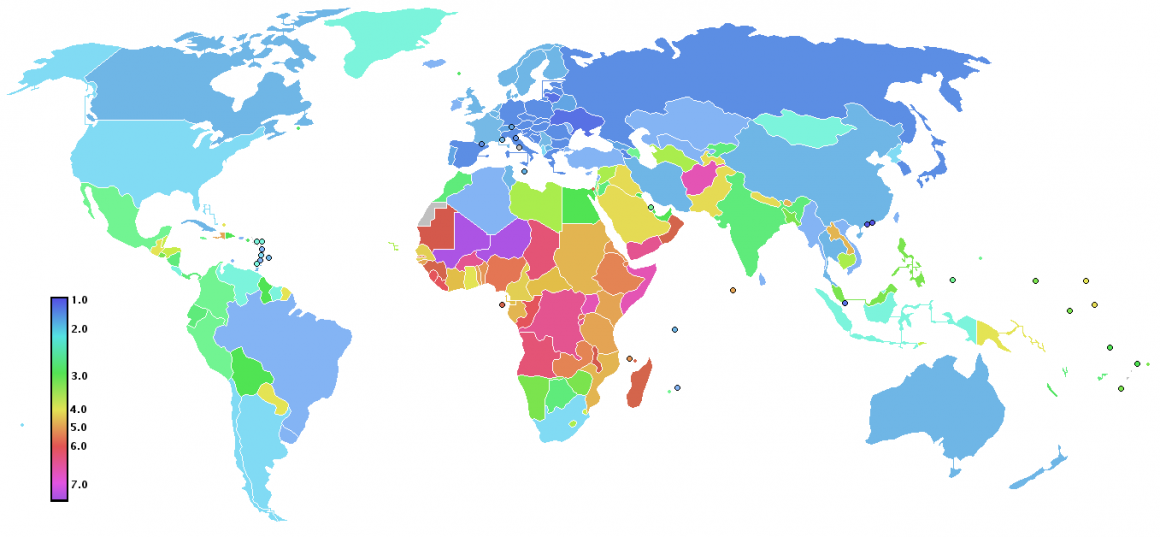Europe’s future depends on immigration, but ending the tragedy in the Mediterranean will require a new approach to education and global inequality.
The challenges posed by immigration in recent years, and exacerbated by the refugee crisis, have caused splits to appear in the European Union’s fabric. Immigration was among the main divisive issues in the Brexit referendum, and now a number of Central and Eastern European countries are refusing to take in refugees, marking a step back from the values of the Union and its core nations.
One root cause of Europe’s immigration “problem” is the huge inequality in our world. Although a vast number of new arrivals in Europe come from war torn countries like Syria, many others originate from economically deprived parts of Africa and South Asia and should be seen primarily as economic migrants.
The poorer developing countries are experiencing population booms and government resources simply cannot keep up. It is naïve to imagine that the people from the world’s poor regions will ever stop trying to reach wealthier countries in hope of a better life.
Europe, like almost every other developed region, faces a demographic crisis. Fertility rates are in decline and the population is ageing. Immigration is often seen as a partial solution to this predicament, though it is not without its pitfalls. After all, how do you integrate people from often totally different cultures while halting the rise of xenophobia and the far-right?
In Denmark, a small European country generally recognised for its social-democratic values and strong welfare state, immigration has become a central political issue. The far-right, nativist Danish People’s Party has grown rapidly in recent years, becoming the second-largest political party at the 2015 election.
Anti-immigrant and asylum-seeker sentiment has grown across the political spectrum, just as the number of asylum seekers has spiked in the tiny country of 5.7 million. The number of asylum seekers increased from 14,792 in 2014 to 21,316 in 2015 according to statistics from the Danish Ministry of Immigration, Integration and Housing.
This pressure will continue to grow. By 2030 the world population is projected to grow by more than one billion. It will reach 9.8 billion in 2050 and 11.2 billion in 2100.
Again, the problem is perhaps not overpopulation as such but the disparity in growth distribution. On the one hand, poor and emerging countries will face great challenges of overpopulation, while on the other, according to the World Economic Forum, the European Union, Japan and the United States will need to revise migration policies and change their economic models if they want to guarantee pensions and social security contributions in the coming years.
Europe’s post-WWII economic model has made it the economic powerhouse it is today, but it has also contributed to smaller families and a steady decline of in fertility rates. Better education, the equal integration of women in the workforce, consumerism, higher living standards that alter our expectations and goals in life and the extension of life expectancy all contribute the phenomenon of an ageing and declining population.
Just as our continent has undergone a huge shift in priorities and policies, so too can other regions. Thus, in my opinion, the solution to Europe’s immigration problem does not lie in sending boats to stop the influx of migrants, or raising walls across vulnerable entry points. We should instead tackle global wealth inequality to help others reach our standard of living.
If the poorer regions close the gap on the developed countries, then their societies will follow similar economic and social models. Combine this with better education and their youth will have the tools they need to build a better future at home, rather than risking their lives to enter Europe illegally.
While some Western “heavyweights” like the USA and Britain choose isolationism and conservatism, some of the smallest European nations are realising that engagement with poor countries is needed to tackle the problem.
Providing quality sex education and increasing the availability of contraception is part of the answer. Speaking at a family planning summit in London last month, Danish Minister for Development Cooperation Ulla Tørnæs justified a 91-million kroner ($15 million) commitment to underwriting contraceptives in Africa.
“To limit the migration pressure on Europe, part of the solution is to reduce the very high population growth in many African countries,” she stated. Tørnæs additionally noted that curtailing African population growth is important for Danish foreign and security policy.
Additionally, Europe should help decriminalizing homosexuality and promote marriage equality for same sex couples in some of the developing countries.
Surely such action is preferable to rescuing capsized boats full of desperate, drowning people. The EU as a whole should follow Denmark’s example and educate poorer societies about the economic and environmental impacts of overpopulation, and how they can be avoided.
The alternative is an ever increasing pressure on richer and less populated countries, with the potential result of either conflict or starvation in poor nations.




